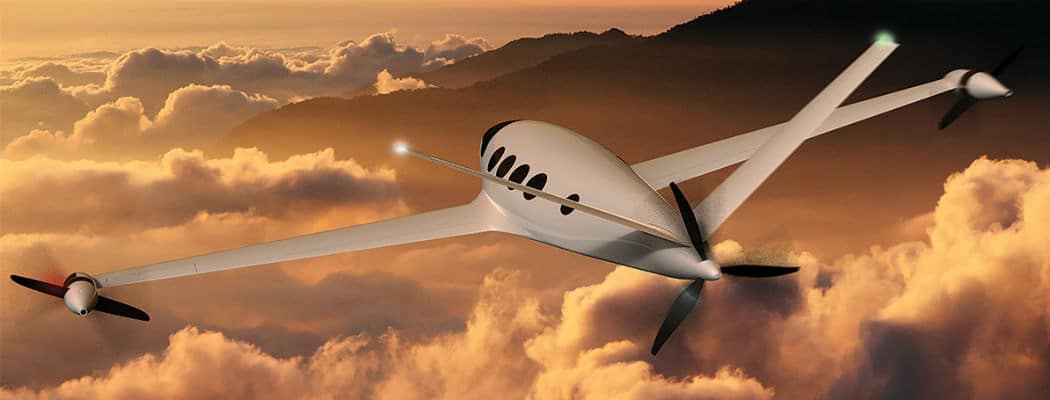Cape Air is expanding its fleet and considering some electrifying new ideas.
Running an airline is a high-wire act. From the unpredictability of fuel costs, to the variability of weather, to the nationwide shortage of pilots, there’s plenty of turbulence to navigate. Dan Wolf is all too familiar with these challenges. Since founding Cape Air nearly thirty years ago, the pilot-turned-CEO-turned-three-term-Massachusetts-state-senator has weathered many storms in growing his airline from one plane with a single route to a fleet serving over 35 destinations around the country. Seventeen thousand of those flights, about 39 percent of Cape Air’s service in the Northeast, take off or land at Nantucket Memorial Airport each year. And while Nantucketers’ opinion of Cape Air can sometimes be up in the air, many will be excited about the new offerings the airline has on the horizon.
Wolf has been on the prowl for new planes for his Cape Air/Nantucket Airlines fleet for fifteen years. The twin-engine Cessna 402 has been Wolf’s workhorse since the airline’s inception. Given Nantucket’s fickle weather and frequent fog, the 402’s duel engines provide a level of safety that Wolf says is critical to making the flight to Nantucket. “There hasn’t been a good airplane to replace the 402 in the last thirty years,” Wolf says. “The replacement airplanes have been built with single-engine turbines. We need a multi-engine airplane.”
Ten years ago, Cape Air issued a request for proposal to aviation companies to custom build a twin-engine plane to replace the 402s. Twelve companies responded, but only one met Cape Air’s criteria. Based in Italy, the aviation company Tecnam collaborated with Wolf and his team to develop the P2012 Traveller, an eleven-person aircraft with twin 375 HP engines.
 “It’s an all-weather airplane that’s the right size to handle the seasonality and will be very reliable,” Wolf says. “The airplane is about 20 percent bigger. The engines produce about 20 percent more power. This airplane also has air conditioning, so passengers are going to love it from a comfort standpoint.” This January, twenty of these new P2012 Travellers will be making the trip to the States from Italy. Not surprisingly, many of Cape Air’s pilots have been lining up to make the inaugural, trans-Atlantic flight. These custom aircraft will make their debut on Nantucket in the spring.
“It’s an all-weather airplane that’s the right size to handle the seasonality and will be very reliable,” Wolf says. “The airplane is about 20 percent bigger. The engines produce about 20 percent more power. This airplane also has air conditioning, so passengers are going to love it from a comfort standpoint.” This January, twenty of these new P2012 Travellers will be making the trip to the States from Italy. Not surprisingly, many of Cape Air’s pilots have been lining up to make the inaugural, trans-Atlantic flight. These custom aircraft will make their debut on Nantucket in the spring.
Looking further into the future, Wolf has his sights set on integrating into his fleet new electric planes that would be powered entirely by renewable energy. He’s been in contact with two companies that are leading this aviation technology, one based in California and the other in Tel Aviv. Eviation, which is based in Israel, is developing an all-electric airplane that has specifications similar to Tecnam’s P2012 Traveller, with two seats in the cockpit and nine in the cabin. The aircraft is futuristic looking with a sleek, teardrop design and propellers off the end of the wings and at the rear of the plane. Sixty-five percent of the plane’s weight is in its lithium-ion battery, leaving the remaining 35 percent in its ultra-light composite body.
“We’re really convinced that as the battery power gets better and better, the feasibility of electric is going to become greater,” Wolf says. “We have our eyes on the solar projects at the airports, additional solar capacity that will be coming online, and the Vineyard wind project. Because as we look at the future of electric technology, we want to make sure we’re charging the airplane with renewable energy — otherwise it defeats the purpose.” Wolf believes that electric planes could be landing on Nantucket as early as 2022.
As for his original 402s, Wolf is not putting them out to pasture just yet. Instead, he’s planning on retrofitting them into lux private aircrafts that could be ordered on demand, what he describes as the “Uber-ization of air travel.”
“I think what you will see from Cape Air in the years ahead is more flexible and more dynamic service,” he says. “We’ll be unveiling something in the next year or two called the Personal Airline Service, which will allow a customer to go on our website and actually call for an airplane to their destination on their schedule. Obviously the pricing will be a little different for that, but that’s a product I think will be really exciting for the summer community on Nantucket.”
 Ticket prices are another front Cape Air hopes to tinker with moving forward. The airline has begun pricing tickets by “bucketing,” in which four seats are available at a certain price, three seats at a certain price, and two seats at a certain price based on demand and historical data. Moreover, Wolf and his team plan on integrating an automated, cellphone check-in service at the airport, which will help eliminate the time-consuming bottlenecks at the ticket counter.
Ticket prices are another front Cape Air hopes to tinker with moving forward. The airline has begun pricing tickets by “bucketing,” in which four seats are available at a certain price, three seats at a certain price, and two seats at a certain price based on demand and historical data. Moreover, Wolf and his team plan on integrating an automated, cellphone check-in service at the airport, which will help eliminate the time-consuming bottlenecks at the ticket counter.
Planes, weather and ticket prices aside, the biggest obstacle Cape Air faces in the future, according to Wolf, continues to be the dire pilot shortage. Yet with its vigorous recruiting program and a fresh lineup of exciting new aircraft to get behind, Wolf is confident that Cape Air will continue climbing higher and higher. And if he’s ever a pilot short, Wolf still knows his way around a cockpit and is always happy to jump on the controls.








